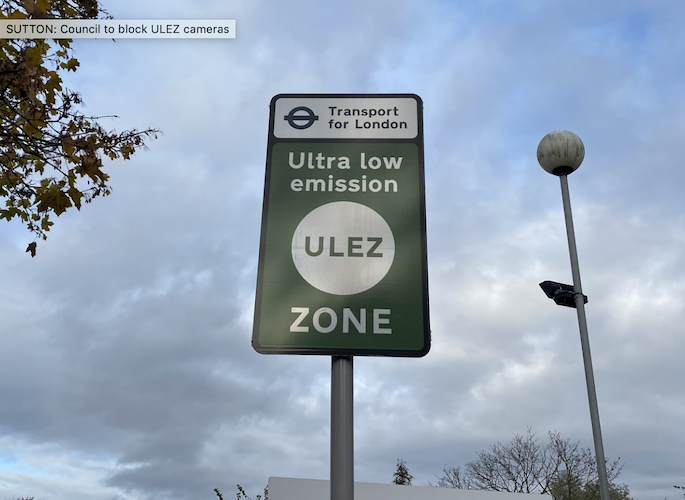Sadiq Khan has asked the leaders of four Conservative-run London councils to “work with me to clean up the dirty air that’s blighting our city” instead of opposing his plan to expand his Ultra-Low Emission Zone to cover all of Greater London from 29 August this year, and advised them to drop their current legal action seeking to prevent it going ahead.
In a letter to councillors Theresa O’Neill (Bexley), Colin Smith (Bromley), Paul Osborn (Harrow) and Ian Edwards (Hillingdon), the Mayor says he regards the ULEZ as integral to his “most important duty” of protecting Londoners’ lives, placing it alongside working with the Metropolitan Police and the London Fire Brigade and with Transport for London to prevent deaths caused by road collisions.
“Each day I am mindful of the families in every borough of our city who have lost loved ones too early because of our toxic air,” Khan writes, and cites research by Imperial College London which estimates Bromley to have “the highest premature deaths linked to air pollution of all London boroughs”, with 204 lost in 2019. The estimate for Bexley was 162 premature deaths, for Hillingdon 155 and for Harrow 118.
He also describes as “not true” accusations by opponents of the expansion, “including the car and fuel lobbies”, that it is designed to make money, stating that TfL “expects net income from ULEZ to fall to nominal levels within the next few years”, and tells the leaders that a response issued to their legal action so far dismisses their ground for doing so as “wholly without merit and misconceived”.
The four councils are among eleven to have expressed misgivings about the expansion of the ULEZ, including the capital’s three Liberal Democrat-controlled boroughs and one Labour authority.
The London Assembly Conservative group and allied media outlets have claimed that most Londoners oppose the changes, though these assertions are based on the outcome of a consultation – which is not the same as a vote or referendum – and the findings of an opinion poll conducted for the group by YouGov which described the purpose of the ULEZ as being “to generate additional revenue for Transport for London” and didn’t mention its primary purpose, which is to reduce air pollution from harmful fumes released by motor vehicles.
An earlier poll conducted for City Hall by the same company which asked Londoners if they backed the scheme’s air quality objectives found 51 per cent in support compared with 27 per cent opposed.
TfL says 85 per cent of vehicles that move through outer London are already compliant with the ULEZ air quality rules and would therefore not face a £12.50 daily fine. A significant percentage of the estimated 160,000 non-compliant vehicles will not be owned by London households. TfL has said it thinks the number will have fallen to 46,000 by the end of the year. The Mayor has announced a financial “scrappage” scheme to help some Londoners, businesses and organisations replace their non-compliant vehicles before the new rules come into effect.
On London strives to provide more of the kind of journalism the capital city needs. Become a supporter for just £5 a month. You will even get things for your money. Learn more here.


This is all well and good if the Mayor also put an end to the Edmonton incinerator rather than just saying he is against it. Actions speak louder than words especially when you look at the ONS infant mortality rates in the various wards of adjacent boroughs. What cannot be ignored is the fact that all residents of these wards are breathing the same air but the ONS do not provide similar figures.
Is there any data on the net effect of ULEZ compared to, for example, the effect of redevelopment programmes and other measures. It should be noted the London is a foggy soup bowl surrounded by hills. The Boroughs resisting ULEZ are outside that soup bowl. It is therefore very rational for them to not be in favour – the benefits to their residents do not outweigh the disbenefits.
Thus Bromley (on the other side of the woody ridge that was “The Great North Wood”, has a much higher proportion of elderly car-owners, many dependent on elderly cars. The quoted LSE data on “premature deaths” does not appear to stand up to any serious scrutiny. I should add that I drive an elderly ULEZ compliant car but have to walk to the shops through a fog of fumes caused by jams of traffic rerouted from LTNs